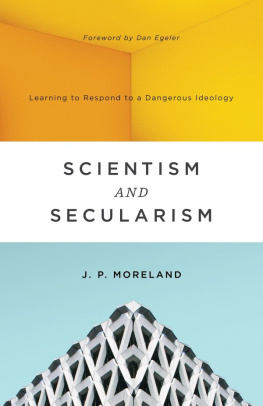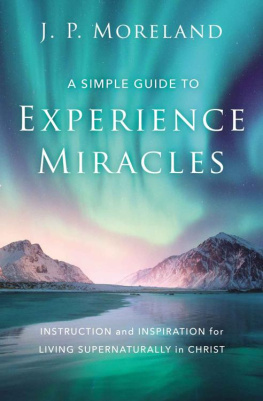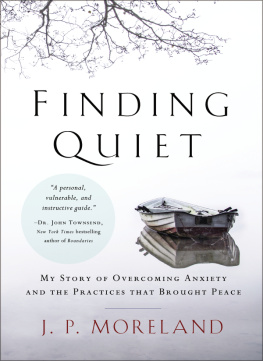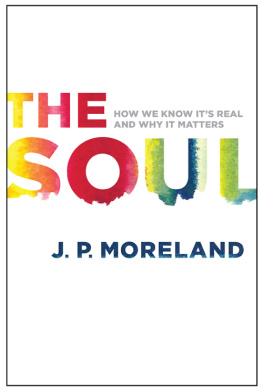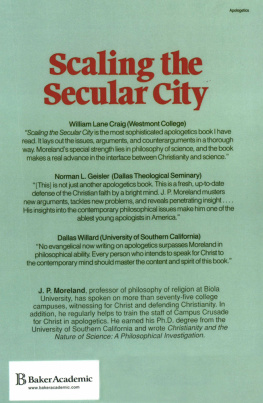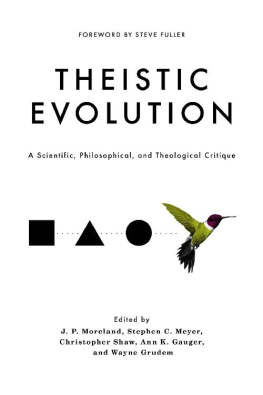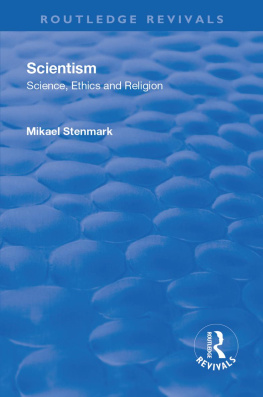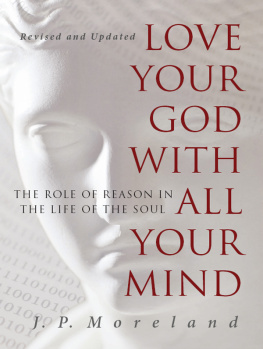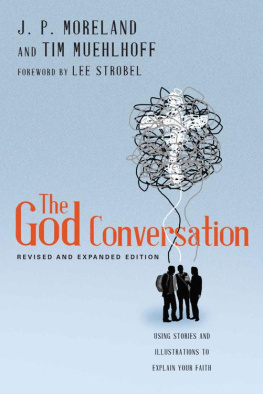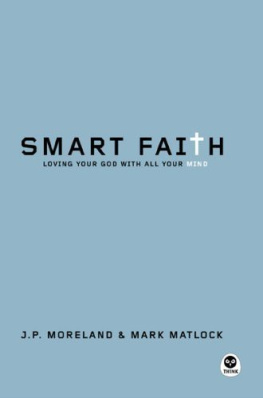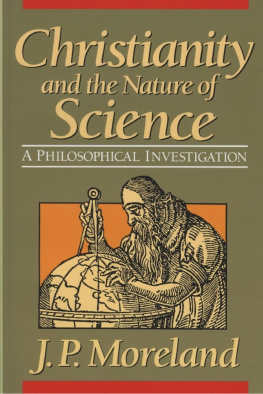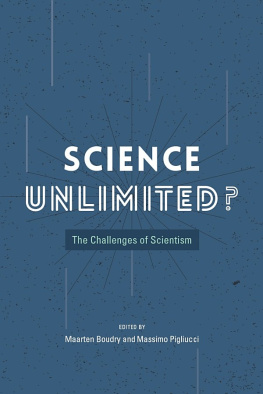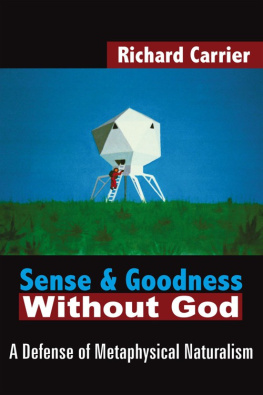Thank you for downloading this Crossway book.
Sign-up for the Crossway Newsletter for updates on special offers, new resources, and exciting global ministry initiatives:
Crossway Newsletter
Or, if you prefer, we would love to connect with you online:
Science is a wonderfully useful discipline, but in recent times it has been distorted into scientism , the view that science is the ultimate path to truth in any area of reality. Based on that false adulation of science, many have denied the value of religion and philosophy, and many have rejected the claims of divine revelation in the Bible. J. P. Moreland is a respected Christian thinker who has studied both science and the Scriptures in considerable depth. He clearly demonstrates the fallacies of the arguments for scientism. He shows how Christians can defend their faith against scientistic objections, while affirming genuine science as a gift from God.
John M. Frame, Professor of Systematic Theology and Philosophy Emeritus, Reformed Theological Seminary, Orlando
Scientism is a silent killer. Despite its name, it is neither scientific nor rational. Yet it attempts to kill our knowledge of God and the good life by claiming that the methods of science are sufficient for any knowledge we may need to know. J. P. Moreland, one of our greatest living philosophers, exposes scientism for what it isa self -r efuting and knowledge -s topping claim. This judgment in no way undermines real science, but rather encourages it. Once more, we are in Morelands debt.
Douglas Groothuis, Professor of Philosophy, Denver Seminary; author, The Soul in Cyberspace
Moreland offers a brilliant critique of scientism and a comprehensive defense of theistic science. As valuable as this critique and defense is, I believe his books greatest contribution is his wake -u p call to Christian leaders of how scientism has forced the church to offer the gospel simply because it works rather than because it is true and can be known as such. Kudos to Moreland for equipping us to know through scientific evidence and philosophical reasoning that the Bible and the gospel indeed are true.
Hugh Ross, President, Reasons to Believe; author, The Creator and the Cosmos ; Improbable Planet ; and Why the Universe Is the Way It Is
Science is a gift from God, but scientism is an idolatrous perversion of that gift that is hostile to the Christian faith and to the proper practice of science. J. P. Moreland rightly contends that Christians need to understand what scientism claims, to recognize its pervasive effects in our society, and to expose its self -d efeating pretensions. Moreland has been reflecting on these issues for decades , and I can think of no one better qualified to write on this topic. This incisive takedown of scientism is long overdue and most welcome.
James N. Anderson, Professor of Theology and Philosophy, Reformed Theological Seminary, Charlotte
J. P. Moreland is one of the great Christian philosophers of our time. He has shown persuasively that we can know God just as well as we can know anything else. If, as philosophers tell as, knowledge constitutes justified true belief, Moreland has shown that we can have such beliefs about Godand, thus, objective, as well as subjective, knowledge of him. In this trenchant critique, he shows not only how the ideology of scientism undermines the justifiable confidence that people should have in their knowledge of God, but that scientism ultimately defeats itself. Scientism claims that hard sciences such as physics, chemistry, and biology provide the only genuine knowledge of reality. Yet, as Moreland shows, scientism does not satisfy its own requirement, because it is not itself based upon scientific evidence or scientific method. Instead, Moreland shows with many concrete examples that many people in our culture simply assume that the hard sciences provide the only foundation for knowledge, leaving them with an impoverished and materialistic view of reality that denies them the joy, hope, and meaning that comes from the knowledge of God. For this reason, Scientism and Secularism is a philosophical treatise with a practical message for anyone wanting to live life more abundantly in accord with genuine knowledge of God. Highly recommended.
Stephen C. Meyer, Director, Center for Science and Culture, Discovery Institute; New York Times best -s elling author, Darwins Doubt
If youve ever been tempted to dismiss a moral, philosophical, or theological belief because you were convinced only science gives real knowledgeor if its been done to youthen youve been taken in by scientism. This popular notion has crippled the confidence of multitudes of Christians, yet in Scientism and Secularism , philosopher J. P. Moreland handily exposes it for the fraud it is. Moreland cuts through the confusion with his characteristic clarity, insight, and surgical precision, deftly refuting the notion that only science can give knowledge while all else is mere opinion, feeling, or faith. Here is Moreland doing what he does bestdispatching foolishness with careful thought and rigorous assessment. For those taken in by the silliness of scientism, this book will be an eye -o pener . Morelands effort also serves as a tutorial in the disappearing art of clear thinking for those floundering in the murky waters of secularism.
Gregory Koukl, President, Stand to Reason; author, The Story of Reality and Tactics
With cross -d isciplinary depth and precise argument, J. P. Moreland not only puts science back in its lane, he defines the laneand in doing so rescues true science from self -d estructive overreach. Anyone responsible for educating the next generation of scientists, theologians, or anyone in between needs this surprisingly readable book.
David Schmus, Executive Director, Christian Educators Association International
J. P. Morelands Scientism and Secularism should be mandatory reading for serious Christians who want to intelligently engage in the interface of philosophy and science. Moreland elegantly guides the reader through concepts typically reserved for serious analytic philosophers and academics. In doing so, he provides a desperately needed and highly accessible treatment of elite -l evel arguments that both seasoned philosophy veterans and enthusiastic amateurs will enjoy. Moreland thus demonstrates a rare ability to distill complicated and abstract philosophical concepts into a framework for everybody to understand.
While scientists who are not philosophically inclined always tend to deride approaches that are not strictly empirical as superfluous, in recent years this tendency has accelerated. Major figures in both academic and popular science characterize philosophy as an anachronism to be abandoned, with only experimental or observable data worthy of discussion. Moreland argues expertly that not only are such claims internally inconsistent, this central dogma of scientism erodes the serious pursuit of knowledge. Scientism isnt just poor science, its poor thinking.
Moreland has crafted an eminently readable text that clearly demonstrates that this kind of crude scientistic thinking should be eschewed by all thinkers not dogmatically committed to worshipping at the altar of reductive physicalism. Scientism and Secularism is a book that should be read by any serious Christian who is motivated to integrate science, philosophy, and faith cogently and cohesively.
Next page
